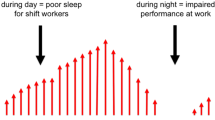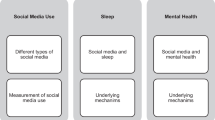Abstract
Rigid work schedules are negatively associated with adults’ sleep. Less is known about whether parents’ work schedule flexibility influences their children’s sleep. We examined associations of mothers’ perceived work schedule flexibility with their children’s sleep over time and whether these associations were mediated by bedtime routine adherence. Two-waves of data were drawn from the Fragile Families and Child Wellbeing Study, a sample of socioeconomically disadvantaged households in large US cities (N = 1040). When the focal children were ages 5 and 9, mothers reported their work schedule flexibility and their child’s bedtime adherence, sleep duration, and difficulty getting to sleep. Cross-sectionally, higher levels of maternal perceived work schedule flexibility were associated with longer child sleep duration and a lower likelihood of having difficulty getting to sleep; these associations were mediated by greater child bedtime adherence. Longitudinally, increases in mothers’ perceived work schedule flexibility from child ages 5 to 9 predicted increases in child bedtime adherence at age 9, which, in turn, predicted increases in child sleep duration at age 9. Increases in perceived work schedule flexibility also predicted a decreased likelihood of children having difficulty getting to sleep, but this association was not mediated by changes in child bedtime adherence. These results suggest that mothers’ perceived work schedule flexibility may be a social determinant of child sleep health, largely through influencing bedtime adherence. Future interventions could consider how to improve bedtime practices in families with working mothers, including by increasing work schedule flexibility perceived by working parents to promote child sleep health.

Similar content being viewed by others
References
American Academy of Pediatrics. (2016). Pediatric clinical practice guidelines & policies. A compendium of evidence-based research for pediatric practice (16th edn.). The American Academy of Pediatrics (2016): Elk Grove Village, IL.
Bakker, A. B., Demerouti, E., & Burke, R. (2009). Workaholism and relationship quality: A spillover-crossover perspective. Journal of Occupational Health Psychology, 14(1), 23–33. https://doi.org/10.1037/a0013290.
Barglow, P., Vaughn, B. E., & Molitor, N. (1987). Effects of maternal absence due to employment on the quality of infant-mother attachment in a low-risk sample. Child Development, 58(4), 945–954.
Bianchi, S. M. (2009). What gives when mothers are employed? Parental time allocation in dual-earner and single-earner two-parent families. In D. R. Crane & E. J. Hill (Eds.), Handbook of families and work: Interdisciplinary perspectives (pp. 305–330). University Press of America, Bianchi (2009): Lanham, MD.
Bronfenbrenner, U., & Ceci, S. J. (1994). Nature-nurture reconceptualized in developmental perspective: A bioecological model. Psychological Review, 101(4), 568–586. https://doi.org/10.1037/0033-295X.101.4.568.
Buxton, O. M., Chang, A.-M., Spilsbury, J. C., Bos, T., Emsellem, H., & Knutson, K. L. (2015). Sleep in the modern family: Protective family routines for child and adolescent sleep. Sleeping Health, 1(1), 15–27. https://doi.org/10.1016/j.sleh.2014.12.002.
Crouter, A. C., Bumpus, M. F., Maguire, M. C., & McHale, S. M. (1999). Linking parents’ work pressure and adolescents’ well being: Insights into dynamics in dual earner families. Developmental Psychology, 35(6), 1453 https://doi.org/10.1037/0012-1649.35.6.1453.
Davis, K. D., Lawson, K. M., Almeida, D. M., Kelly, E. L., King, R. B., Hammer, L., et al. (2015). Parents’ daily time with their children: A workplace intervention. Pediatrics, 135(5), 875–82. https://doi.org/10.1542/peds.2014-2057.
Demerouti, E., Bakker, A. B., & Schaufeli, W. B. (2005). Spillover and crossover of exhaustion and life satisfaction among dual-earner parents. Journal of Vocational Behavior, 67(2), 266–289. https://doi.org/10.1016/j.jvb.2004.07.001.
Dush, C. M. K., Schmeer, K. K., & Taylor, M. (2013). Chaos as a social determinant of child health: Reciprocal associations? Social Science and Medicine, 95, 69–76. https://doi.org/10.1016/j.socscimed.2013.01.038.
Enchautegui, M. E., Johnson, M., & Gelatt, J. (2015). Who minds the kids when mom works a nonstandard schedule? Report. Washington DC: Urban Institute.
Fisher, R. J. (1993). Social desirability bias and the validity of self-reported values. Journal of Consumer Research, 20(2), 303–315. https://doi.org/10.1002/(SICI)1520-6793(200002)17.
Hale, L., Berger, L. M., LeBourgeois, M. K., & Brooks-Gunn, J. (2009). Social and demographic predictors of preschoolers’ bedtime routines. Journal of Developmental & Behavioral Pediatrics, 30(5), 394–402. https://doi.org/10.1097/DBP.0b013e3181ba0e64.
Hale, L., Berger, L. M., LeBourgeois, M. K., & Brooks-Gunn, J. (2011). A longitudinal study of preschoolers’ language-based bedtime routines, sleep duration, and well-being. Journal of Family Psychology, 25(3), 423–433. https://doi.org/10.1037/a0023564.
Hammer, L. B., Allen, E., & Grigsby, T. D. (1997). Work–family conflict in dual-earner couples: Within-individual and crossover effects of work and family. Journal of Vocational Behavior, 50(2), 185–203. https://doi.org/10.1006/jvbe.1996.1557.
Harris, K. M., King, R. B., & Gordon-Larsen, P. (2005). Healthy habits among adolescents: Sleep, exercise, diet, and body image. In K. A. Moore & L. H. Lippman (Eds.), What do children need to flourish: Conceptualizing and measuring indicators of positive development (pp. 111–132). Boston: Springer.
Hayes, A. F. (2009). Beyond Baron and Kenny: Statistical mediation analysis in the new millennium. Communication Monographs, 76(4), 408–420. https://doi.org/10.1080/03637750903310360.
Hayes, A. F. (2013). Introduction to mediation, moderation, and conditional process analysis: A regression-based approach. New York, NY: Guilford Publications.
Hirshkowitz, M., Whiton, K., Albert, S. M., Alessi, C., Bruni, O., DonCarlos, L., et al. (2015). National sleep foundation’s sleep time duration recommendations: Methodology and results summary. Sleeping Health, 1(1), 40–43. https://doi.org/10.1016/j.sleh.2014.12.010.
Hiscock, H., Canterford, L., Ukoumunne, O. C., & Wake, M. (2007). Adverse associations of sleep problems in Australian preschoolers: national population study. Pediatrics, 119(1), 86–93. https://doi.org/10.1542/peds.2006-1757.
Jackson, C. L., Redline, S., Kawachi, I., Williams, M. A., & Hu, F. B. (2013). Racial disparities in short sleep duration by occupation and industry. American Journal of Epidemiology, 178(9), 1442–1451. https://doi.org/10.1093/aje/kwt159.
Kalil, A., Dunifon, R., Crosby, D., & Houston Su, J. (2014). Work hours, schedules, and insufficient sleep among mothers and their young children. Journal of Marriage and Family, 76(5), 891–904. https://doi.org/10.1111/jomf.12142.
Kelliher, C., & Anderson, D. (2009). Doing more with less? Flexible working practices and the intensification of work. Human Relations, 63(1), 83–106. https://doi.org/10.1177/0018726709349199.
Kelly, E. L., Moen, P., Oakes, J. M., Fan, W., Okechukwu, C., Davis, K. D., et al. (2014). Changing work and work-family conflict: Evidence from the work, family, and health network. American Sociological Review, 79(3), 485–516. https://doi.org/10.1177/0003122414531435.
Kelly, E. L., Moen, P., & Tranby, E. (2011). Changing workplaces to reduce work-family conflict: Schedule control in a white-collar organization. American Sociological Review, 76(2), 265–290. https://doi.org/10.1177/0003122411400056.
Lambert, S. J. (2008). Passing the buck: Labor flexibility practices that transfer risk onto hourly workers. Human Relations, 61(9), 1203–1227. https://doi.org/10.1177/0018726708094910.
Lambert, S. J., Haley-lock, A., Henly, J. R., Lambert, S. J., Haley-lock, A., & Schedule, J. R. H. (2012). Schedule flexibility in hourly jobs: unanticipated consequences and promising directions. Community, Work & Family, 15(3), 293–315. https://doi.org/10.1080/13668803.2012.662803.
Lee, S., Davis, K. D., McHale, S. M., Kelly, E. L., Kossek, E. E., & Crouter, A. C. (2017). When mothers’ work matters for youths’ daily time use: Implications of evening and weekend shifts. Journal of Child and Family Studies, 26(8), 2077–2089. https://doi.org/10.1007/s10826-017-0731-7.
MacKinnon, D. P. (2008). Introduction to statistical mediation analysis. Mahwah, NJ: Lawrence Erlbaum Associates, Inc.
Magee, C. A., Caputi, P., & Iverson, D. C. (2012). Are parents’ working patterns associated with their child’s sleep? An analysis of dual-parent families in Australia. Sleeping and Biological Rhythms, 10(2), 100–108. https://doi.org/10.1111/j.1479-8425.2011.00530.x.
Magee, C. A., Gordon, R., & Caputi, P. (2014). Distinct developmental trends in sleep duration during early childhood. Pediatrics, 133(6), e1561–e1567. https://doi.org/10.1542/peds.2013-3806.
McHale, S. M., Lawson, K. M., Davis, K. D., Casper, L., Kelly, E. L., & Buxton, O. (2015). Effects of a workplace intervention on sleep in employees’ children. Journal of Adolescent Health, 56(6), 672–677. https://doi.org/10.1016/j.jadohealth.2015.02.014.
McLanahan, S. (2004). Diverging destinies: How children are faring under the second demographic transition. Demography, 41(4), 607–627.
Mindell, J. A., Li, A. M., Sadeh, A., Kwon, R., & Goh, D. Y. T. (2015). Bedtime routines for young children: A dose-dependent association with sleep outcomes. Sleep, 38(5), 717–22. https://doi.org/10.5665/sleep.4662.
Paruthi, S., Brooks, L. J., D’Ambrosio, C., Hall, W. A., Kotagal, S., Lloyd, R. M., et al. (2016). Consensus statement of the American Academy of Sleep Medicine on the recommended amount of sleep for healthy children: Methodology and discussion. Journal of Clinical Sleeping Medicine, 12(11), 1549–1561. https://doi.org/10.5664/jcsm.6288.
Pedersen, D. E. (2014). Spillover and crossover of work-to-family conflict and the health behaviors of dual-earner parents with young children. Sociological Focus, 47(1), 45–60. https://doi.org/10.1080/00380237.2014.855980.
Podsakoff, P. M., MacKenzie, S. B., Lee, J.-Y., & Podsakoff, N. P. (2003). Common method variance in behavioral research: A critical review of the literature and recommended remedies. Journal of Applied Psychology, 88(5), 879–903. https://doi.org/10.1037/0021-9010.88.5.879.
Presser, H. B. (2003). Working in a 24/7 economy: Challenges for American families. New York, NY: Russell Sage Foundation.
Reichman, N., Teitler, J., Garfinkel, I., & McLanahan, S. (2001). Fragile familes: Sample and design. Children and Youth Services Review, 23(4/5), 303–326.
Roeters, A., Van Der Lippe, T., & Kluwer, E. S. (2010). Work characteristics and parent-child relationship quality: The mediating role of temporal involvement. Journal of Marriage and Family, 72(5), 1317–1328. https://doi.org/10.1111/j.1741-3737.2010.00767.x.
Stewart, J. (2014). Early to bed and earlier to rise: School, maternal employment, and children’s sleep. Review of Economics of the Household, 12(1), 29–50. https://doi.org/10.1007/s11150-013-9182-0.
ten Brummelhuis, L. L., & Bakker, A. B. (2012). A resource perspective on the work-home interface: The work-home resources model. The American Psychologist, 67(7), 545–56. https://doi.org/10.1037/a0027974.
Westman, M. (2001). Stress and strain crossover. Human Relations, 54, 717–751. https://doi.org/10.1177/0018726701546002.
Westman, M., & Hamilton, V. L. (2004). Crossover of marital dissatisfaction during military downsizing among Russian army officers and their spouses. Journal of Applied Psychology, 89(5), 769–779. https://doi.org/10.1037/0021-9010.89.5.769.
Whinnery, J., Jackson, N., Rattanaumpawan, P., & Grandner, M. A. (2014). Short and long sleep duration associated with race/ethnicity, sociodemographics, and socioeconomic position. Sleep, 37(3), 601–11. https://doi.org/10.5665/sleep.3508.
Author Contributions
S.L.: initiated and performed the analyses and drafted the manuscript. L.H.: collaborated with the design and writing of the study. L.M.B.: collaborated with the design and writing of the study. O.M.B.: collaborated in the writing and editing the final manuscript. All authors contributed to the revision of the manuscript and approved the final submitted version.
Funding
This study was funded by the Eunice Kennedy Shriver National Institute of Child Health and Human Development (NICHD) of the National Institutes of Health (R01HD36916, R01HD39135, R01HD40421 and R01HD073352). The content is solely the responsibility of the authors and does not necessarily represent the official views of the National Institutes of Health.
Author information
Authors and Affiliations
Corresponding author
Ethics declarations
Conflict of Interest
The authors have indicated no financial conflicts of interest relevant to the current study. Outside of the current work, Orfeu M. Buxton received two subcontract grants to Penn State from Mobilesleeptechnologies (NSF/STTR #1622766, NIH/NIA SBIR R43AG056250).
Ethical Approval
All procedures performed in studies involving human participants were in accordance with the ethical standards of the institutional and/or national research committee and with the 1964 Helsinki declaration and its later amendments or comparable ethical standards.
Informed Consent
Informed consent was obtained from all individual participants included in the study.
Rights and permissions
About this article
Cite this article
Lee, S., Hale, L., Berger, L.M. et al. Maternal Perceived Work Schedule Flexibility Predicts Child Sleep Mediated by Bedtime Routines. J Child Fam Stud 28, 245–259 (2019). https://doi.org/10.1007/s10826-018-1262-6
Published:
Issue Date:
DOI: https://doi.org/10.1007/s10826-018-1262-6




